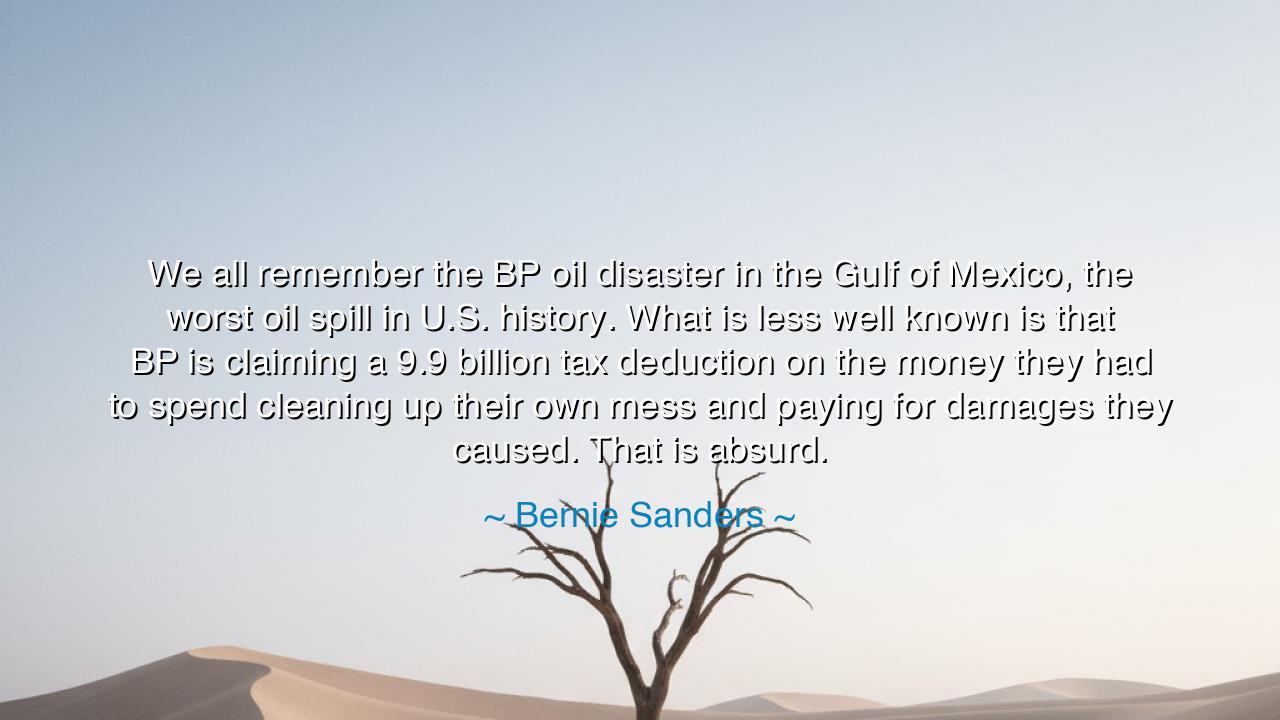
We all remember the BP oil disaster in the Gulf of Mexico, the
We all remember the BP oil disaster in the Gulf of Mexico, the worst oil spill in U.S. history. What is less well known is that BP is claiming a 9.9 billion tax deduction on the money they had to spend cleaning up their own mess and paying for damages they caused. That is absurd.






In the fiery and indignant tone of one who speaks for the people and the planet, Bernie Sanders once proclaimed: “We all remember the BP oil disaster in the Gulf of Mexico, the worst oil spill in U.S. history. What is less well known is that BP is claiming a 9.9 billion tax deduction on the money they had to spend cleaning up their own mess and paying for damages they caused. That is absurd.” These words, though born of modern outrage, echo an ancient moral law—that those who wound the earth must bear the weight of their deeds, and that justice cannot be bought with silver or soothed with bureaucratic deceit. Sanders’ voice here is not the voice of politics alone; it is the voice of conscience, crying out against the arrogance of power and the blindness of greed.
To understand the origin of this quote, we must return to the year 2010, when the Deepwater Horizon oil rig, operated by BP (British Petroleum), exploded in the Gulf of Mexico. Eleven workers lost their lives, and nearly five million barrels of oil poured into the sea, blackening its waters for months. The disaster killed untold marine life, devastated coastlines, and shattered communities whose livelihoods depended on the ocean. It was the worst oil spill in U.S. history, a scar so vast it could be seen from space. BP eventually agreed to pay over $20 billion in fines, settlements, and cleanup costs—an unprecedented sum. Yet, as Sanders revealed years later, the corporation sought to ease this burden by claiming a $9.9 billion tax deduction, using the very system meant to serve the public as a shield against responsibility.
Sanders’ outcry—his declaration that this was absurd—was not mere rhetoric. It was a call to remember the difference between justice and legality. The law, he knew, can be twisted by those with wealth and influence; but justice is eternal and cannot be bent. To pay for one’s crimes with the right hand while reclaiming the payment with the left is no repentance at all. His words thus expose the moral hypocrisy that festers when the powerful write the rules that govern their own wrongdoing. In the language of the ancients, it is as if the empire that pillaged the earth now demands applause for sweeping its own ashes.
History is filled with such tales of hubris—of those who believed they could pollute, exploit, or destroy and yet escape the consequences. The Roman Senate once allowed its patricians to profit from wars they themselves waged, enriching their estates while the republic starved. The mighty industrialists of the nineteenth century poisoned rivers and lungs in the name of progress, while governments turned away in silence. Each time, society paid the cost: the poor, the laborer, the farmer, the earth itself. And each time, the lesson returned like a storm: those who harm the world for profit will one day stand before the court of the world itself. Sanders’ warning carries this same timeless echo. The earth has memory, and injustice, no matter how well hidden behind tax codes or contracts, will not remain unseen.
There is, too, in Sanders’ words, a lament for what humanity has forgotten. Once, stewardship of the land was sacred. The farmer and the fisherman understood that to take from the earth was to owe it care. But in an age where corporations stand taller than nations, profit often outweighs reverence. The BP oil spill was not only an environmental catastrophe—it was a spiritual one. It revealed how far civilization had drifted from its roots, from the humility that once guided our relationship with the natural world. When Sanders calls BP’s tax maneuver absurd, he speaks not only as a legislator but as a moral witness, reminding us that when greed masquerades as business, when destruction is rewarded as enterprise, civilization itself becomes complicit in its own undoing.
Yet even in his condemnation, Sanders’ message carries hope. For he believes, as do all who have faith in democracy and justice, that awareness is the first act of change. To call out absurdity is to strip it of its disguise. His words awaken the sleeping conscience of a people numbed by corporate deception, urging them to demand accountability—not only from companies like BP, but from the systems that enable them. The lesson is clear: the earth cannot heal while injustice is profitable, and society cannot endure while truth is for sale.
So, O listener of conscience, take this teaching to heart: do not mistake legality for morality, nor silence for peace. When you see wrong disguised as order, speak as Sanders spoke—with courage, with clarity, with conviction. Support leaders and movements that place the welfare of the earth and its people above the greed of corporations. Consume wisely, question authority, and protect what is sacred. For the fate of the Gulf, the forests, the air, and the oceans is bound to your own. And remember always the wisdom behind Sanders’ words: those who sow corruption and carelessness may profit for a season, but their harvest will be bitter, and their legacy stained by the very oil with which they darkened the sea.






AAdministratorAdministrator
Welcome, honored guests. Please leave a comment, we will respond soon